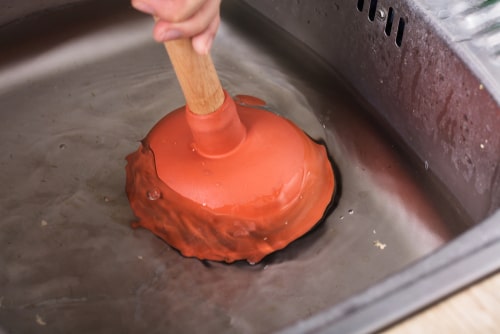Disposing of Coffee Grounds Down the Sink: Yes or No? - Considerations You Should Know
Disposing of Coffee Grounds Down the Sink: Yes or No? - Considerations You Should Know
Blog Article
Are you on the lookout for know-how around Can Coffee Grounds Go Down the Drain or Sink??

If you're an avid coffee enthusiast, you may be wondering about the most effective means to take care of your coffee grounds. While it may appear hassle-free to clean them down the sink, this practice can cause numerous problems for both your plumbing and the environment. In this write-up, we'll check out whether it's risk-free to put coffee premises down the sink and review alternate disposal techniques to consider.
Alternatives to Disposing of Coffee Grounds
Garbage Disposal
If you do not have a composting setup, one more option is to just throw your coffee premises in the garbage. Be sure to seal them in a compostable bag or container to avoid smells and leakage. While this approach does not provide the very same environmental benefits as composting, it's a safe and practical method to throw away coffee grounds.
Composting
One eco-friendly option for dealing with coffee grounds is to compost them. Coffee grounds are rich in nitrogen, making them an excellent addition to compost heap or bins. As they break down, they add nutrients to the dirt, enhancing its fertility and appearance.
Threats of Putting Coffee Grounds Down the Sink
Plumbing Issues
Among the primary concerns with dealing with coffee grounds down the sink is the danger of obstructing your pipes. Coffee premises don't dissolve in water and can accumulate over time, creating a thick sludge that can obstruct drains and bring about pricey plumbing fixings.
Environmental Impact
Beyond the possible damages to your plumbing, placing coffee premises down the sink can additionally damage the atmosphere. When washed right into the sewer system, coffee premises can contribute to blockages in drain lines and therapy centers. Furthermore, the high concentration of raw material in coffee grounds can deplete oxygen degrees in rivers, adversely affecting aquatic life.
Tips for Proper Disposal
Normal Maintenance
Despite how you pick to deal with your coffee grounds, it's vital to preserve your plumbing frequently. Set up periodic drain cleanings to get rid of any build-up and guarantee that your pipelines stay clear and free-flowing.
Make Use Of a Sink Strainer
To avoid coffee grounds from entering your sink's drainpipe in the first place, consider using a sink filter. These inexpensive gadgets trap strong fragments, consisting of coffee premises, preventing them from triggering blockages.
Verdict
While it may be tempting to clean coffee grounds down the sink for ease, doing so can have severe repercussions for your plumbing and the environment. Instead, think about composting your coffee premises or dealing with them in the garbage. By taking on responsible disposal practices, you can appreciate your coffee guilt-free while reducing your eco-friendly footprint.
Coffee Grounds Down The Drain: Are They OK?
Can Coffee Grounds Go Down the Sink?
You may be thinking, “But I pour them down the sink drain every day and I’ve never had a clogged drain!” You see, coffee grounds come from coffee beans, which are virtually rock hard by the time they’re ground and brewed. You certainly wouldn’t want to grind up the pit from a peach, apricot, or nectarine that is about just as hard because they wouldn’t break down like other foods, and it’s the same with coffee beans!
If you usually grind coffee beans in the garbage disposal because it seems the cleanest and convenient, we don’t fault you for that. And anyone who has ever had to clean up the trash with spilled coffee grounds after a dog got into it would understand the rationale. Unfortunately, coffee grounds do not break down in water, so instead of grinding up and washing away as normal foods do in a garbage disposal, they clump together and as time goes by, the grounds can form a clump and pack the drain until it develops a clog.
What to Do With Coffee Grounds
So, what do you do with coffee grounds if you can't put them down the drain? You could of course just throw them in the garbage, but we encourage you to give these practical uses for them a try!
Since coffee grounds contain key minerals for plant growth, you can use them to fertilize your garden. Coffee grounds not only fertilize gardens because they are mineral-rich, but they are also great at absorbing contaminants in the soil, particularly heavy metals. Coffee grounds are said to attract worms, which help gardens flourish. You can use coffee grounds as fertilizer by sprinkling them around your plants. You can compost your coffee grounds and use them at a later time. Coffee grounds are great insect repellents when you place them in bowls or sprinkle them around the areas you want to repel insects. To remove fleas from your dog or cat, simply shampoo your pet then rub coffee grounds throughout their fur. Rinse them off and dry as usual. Like baking soda, used coffee grounds can eliminate odors. You can place them in a bowl in the fridge and let them do the work! Mix coffee grounds with coconut oil for a wonderful face or body scrub, or to reduce the appearance of cellulite. https://www.wintershomeservices.com/blog/2019/august/coffee-grounds-down-the-drain-are-they-ok-/

Do you like more info about What are the consequences of putting coffee grounds? Create feedback directly below. We will be glad to know your reactions about this blog post. We are looking forward to see you back again later on. Are you aware of another person who is excited about Should You Put Coffee Grounds Down the Sink?? Please feel free to share it. Kudos for your time. Visit us again soon.
Check Us Out Report this page